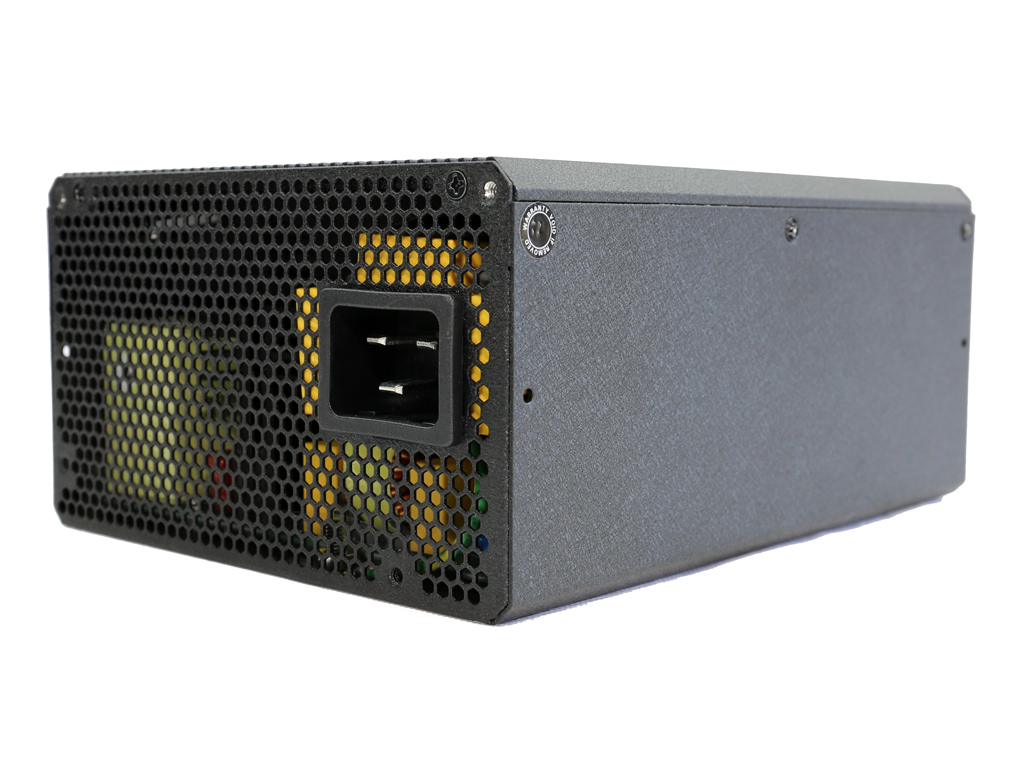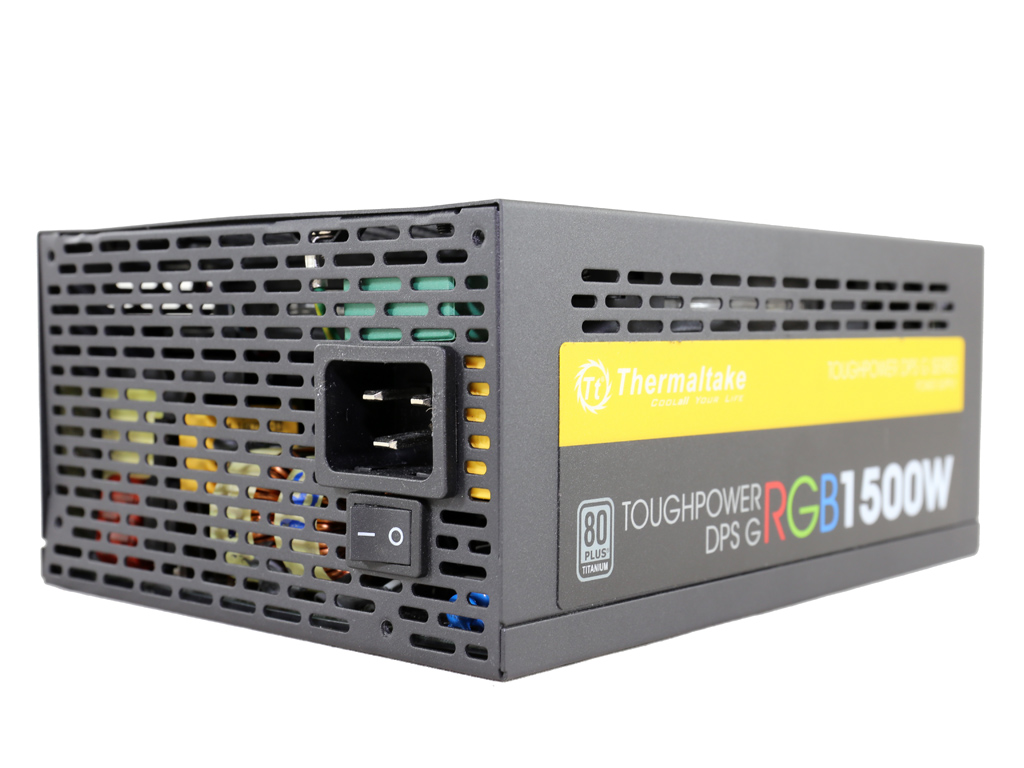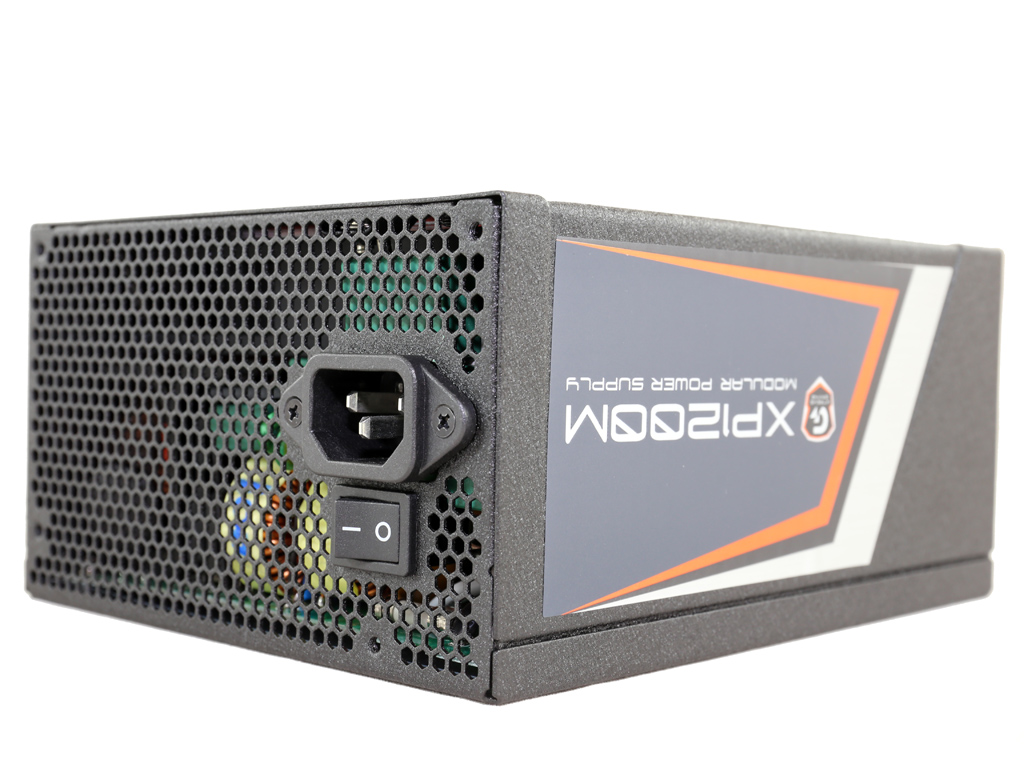Rosewill Tokamak 1500 PSU Review
Rosewill enters the 80 PLUS Titanium efficiency club with two Tokamak models boasting 1.2kW and 1.5kW of capacity. The highest-end version is on our bench today, and we're eager to check out its Enhance-based platform.
Why you can trust Tom's Hardware
Load Regulation, Hold-Up Time, And Inrush Current
To learn more about our PSU tests and methodology, please check out How We Test Power Supply Units.
Primary Rails And 5VSB Load Regulation
Load Regulation testing is detailed here.
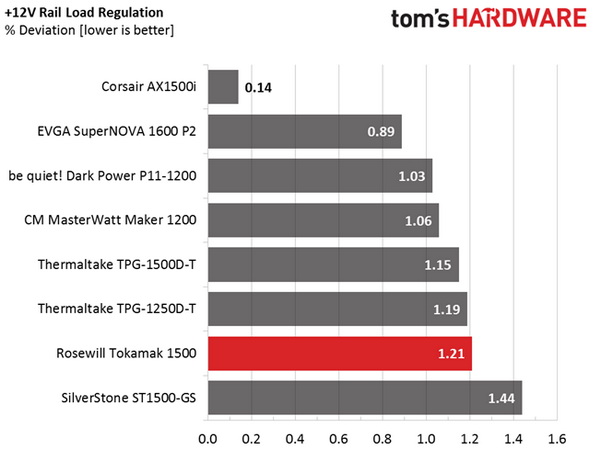
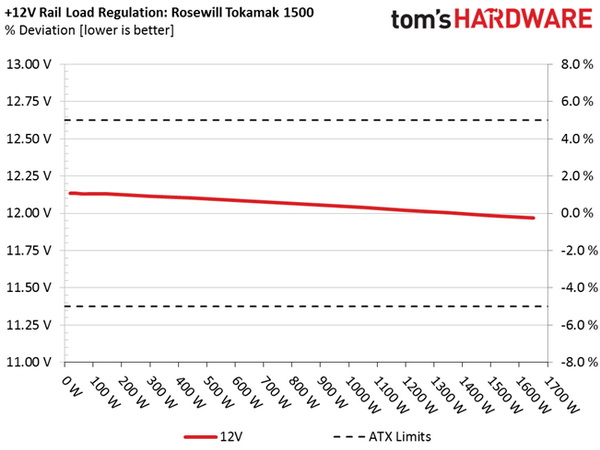
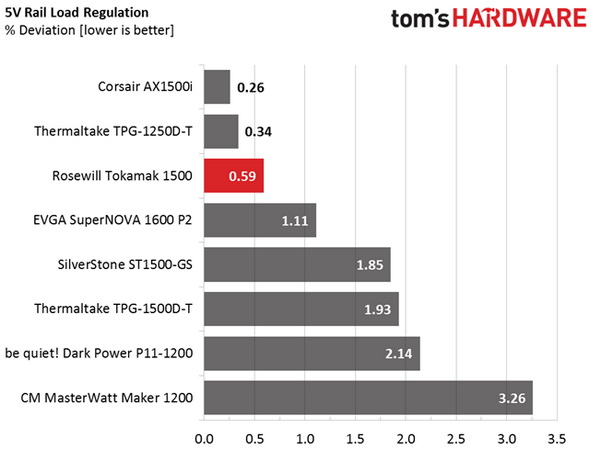
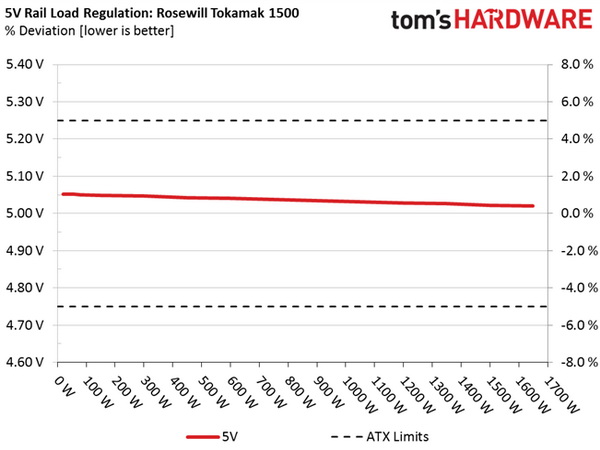
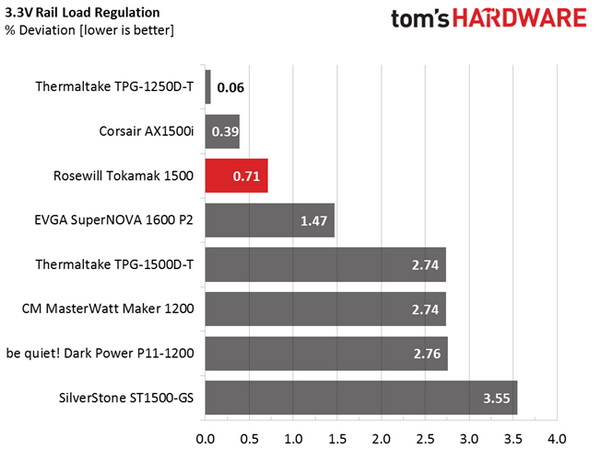
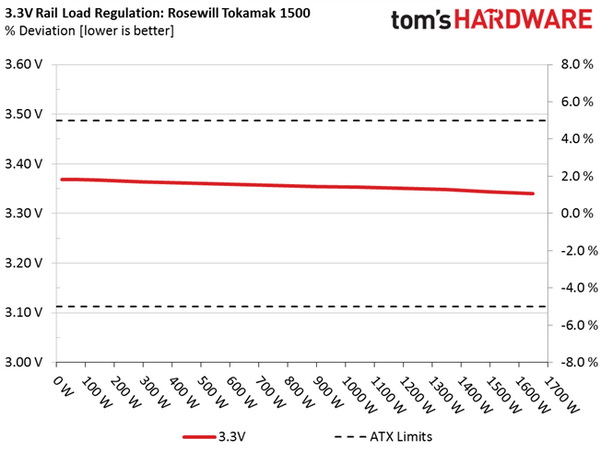
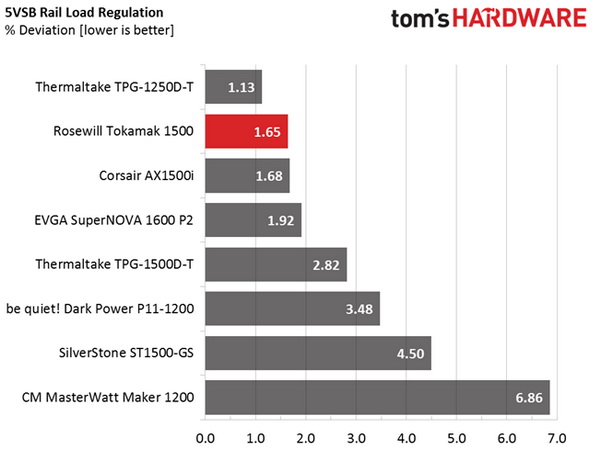
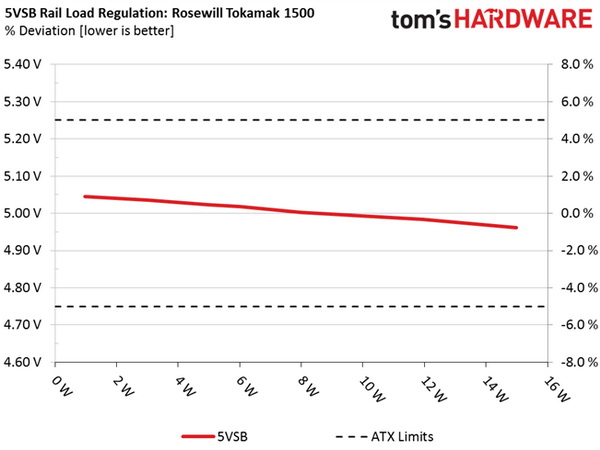
Hold-Up Time
Our hold-up time tests are described in detail here.
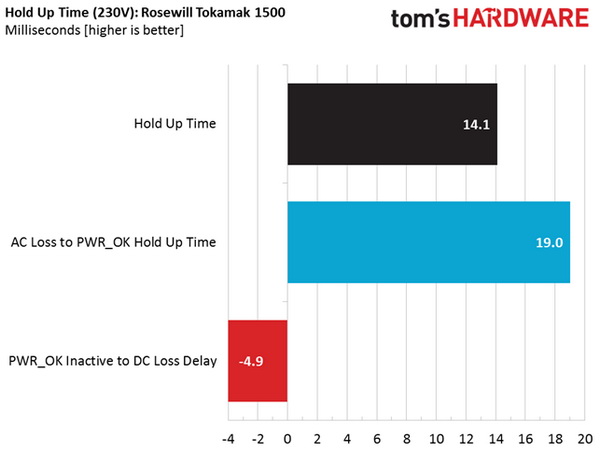
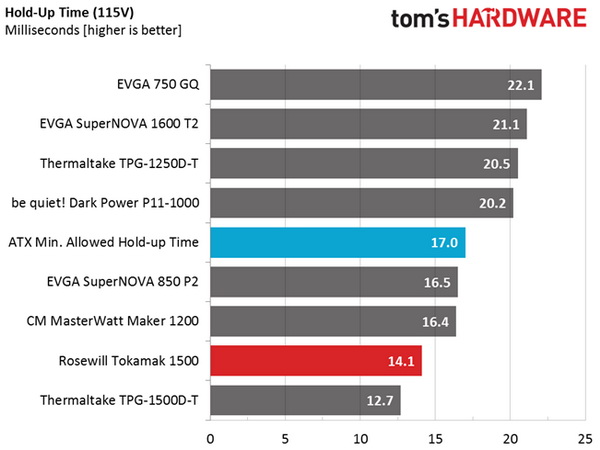
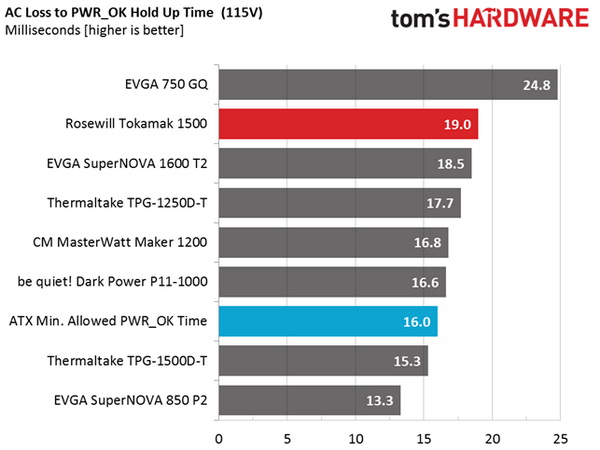
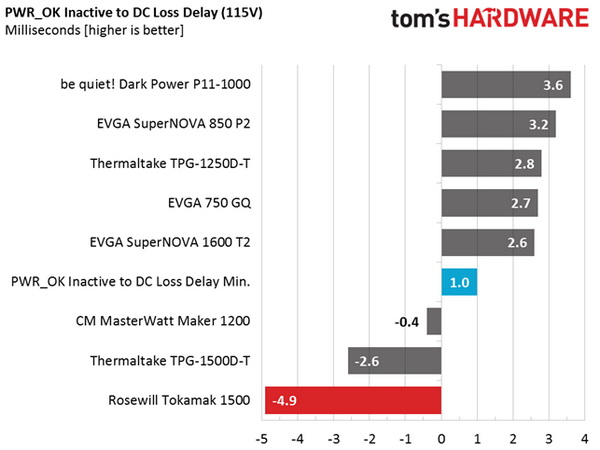
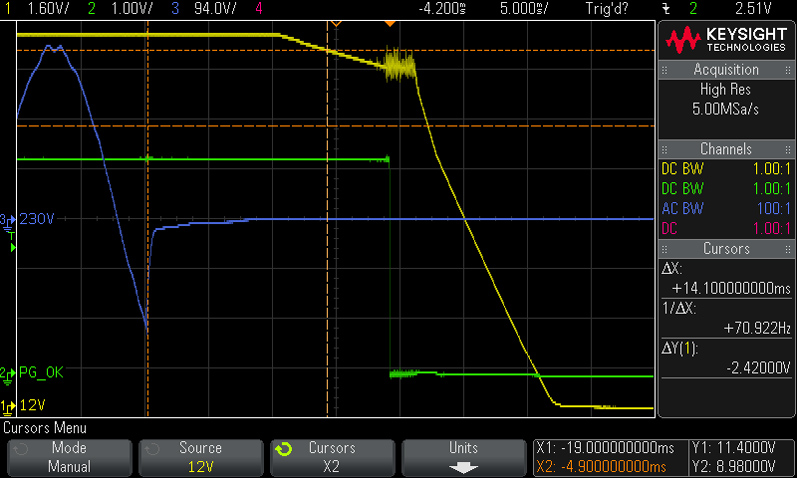
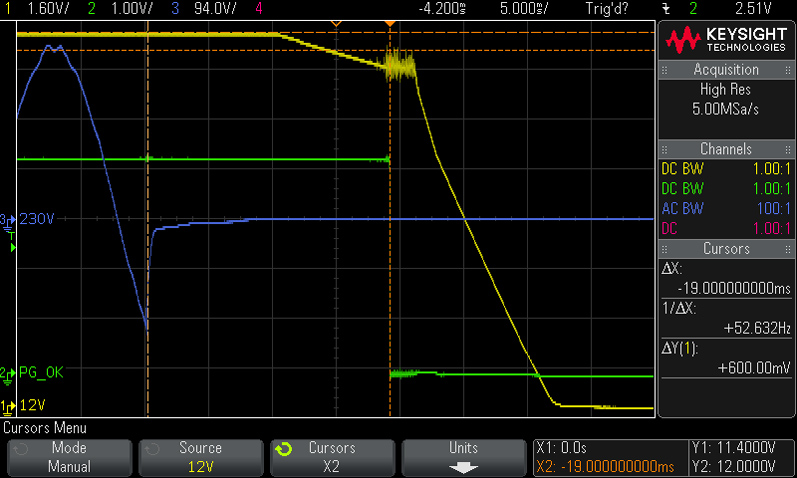
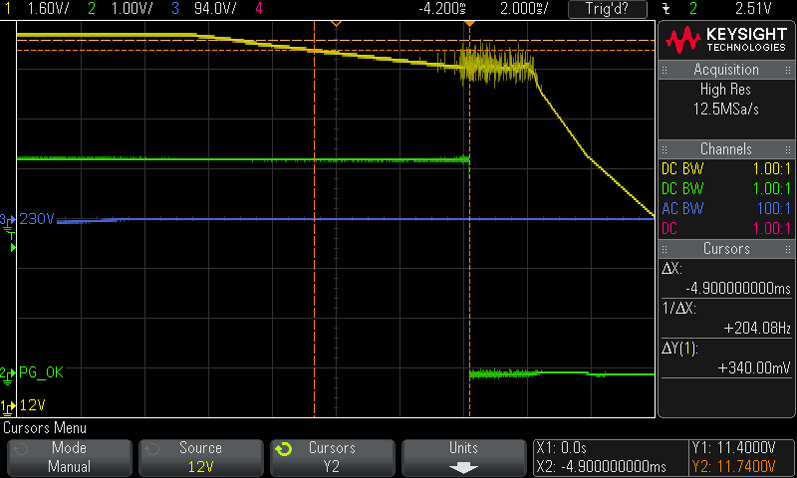
The hold-up time we measured is lower than 17ms, and to our disappointment, the power-good signal is inaccurate. It drops when the rails are already out of spec.
Inrush Current
For details on our inrush current testing, please click here.
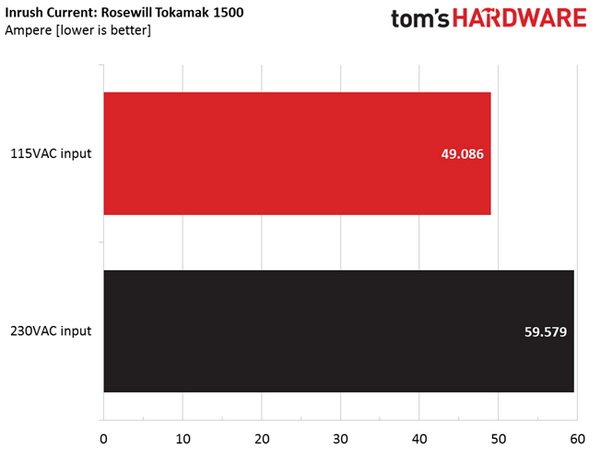
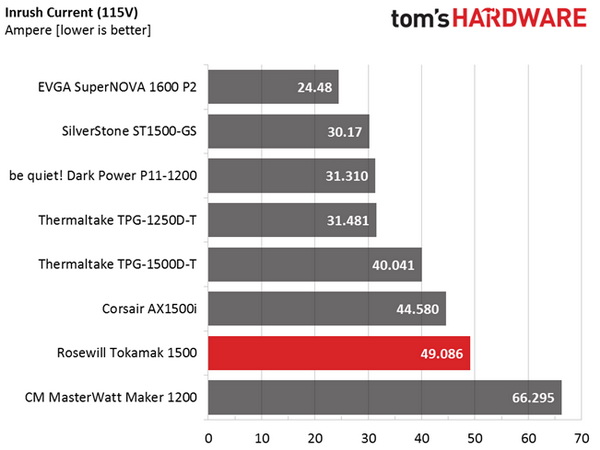
The inrush current results are a little higher than the competition in this category.
Load Regulation And Efficiency Measurements
The first set of tests reveals the stability of the voltage rails and the Tokamak 1500's efficiency. The applied load equals (approximately) 10 to 110 percent of the PSU's maximum load in increments of 10 percentage points.
Get Tom's Hardware's best news and in-depth reviews, straight to your inbox.
We conducted two additional tests. During the first, we stressed the two minor rails (5V and 3.3V) with a high load, while the load at +12V was only 0.1A. This test reveals whether a PSU is Haswell-ready or not. In the second test, we determined the maximum load the +12V rail could handle with minimal load on the minor rails.
| Test # | 12V | 5V | 3.3V | 5VSB | DC/AC (Watts) | Efficiency | Fan Speed | Fan Noise | Temps (In/Out) | PF/AC Volts |
|---|---|---|---|---|---|---|---|---|---|---|
| 1 | 10.571A | 1.980A | 1.959A | 0.995A | 149.83 | 91.90% | 850 RPM | 33.1 dB(A) | 36.30°C | 0.939 |
| 12.131V | 5.049V | 3.367V | 5.023V | 163.03 | 39.49°C | 115.0V | ||||
| 2 | 22.195A | 2.967A | 2.939A | 1.195A | 299.77 | 93.85% | 850 RPM | 33.1 dB(A) | 37.31°C | 0.965 |
| 12.116V | 5.047V | 3.364V | 5.018V | 319.43 | 41.18°C | 115.0V | ||||
| 3 | 34.188A | 3.468A | 3.449A | 1.394A | 449.77 | 93.99% | 890 RPM | 35.1 dB(A) | 37.87°C | 0.978 |
| 12.101V | 5.043V | 3.361V | 5.010V | 478.54 | 42.98°C | 115.0V | ||||
| 4 | 46.205A | 3.962A | 3.928A | 1.596A | 599.58 | 93.65% | 1430 RPM | 46.3 dB(A) | 38.97°C | 0.984 |
| 12.086V | 5.040V | 3.359V | 5.003V | 640.26 | 44.26°C | 115.0V | ||||
| 5 | 57.923A | 4.966A | 4.915A | 1.801A | 749.64 | 92.97% | 1785 RPM | 51.5 dB(A) | 39.44°C | 0.987 |
| 12.070V | 5.037V | 3.356V | 4.998V | 806.29 | 44.97°C | 115.0V | ||||
| 6 | 69.651A | 5.953A | 5.901A | 2.000A | 899.39 | 91.80% | 2220 RPM | 56.1 dB(A) | 40.66°C | 0.990 |
| 12.055V | 5.034V | 3.354V | 4.993V | 979.75 | 46.56°C | 115.0V | ||||
| 7 | 81.419A | 6.955A | 6.888A | 2.202A | 1049.36 | 91.20% | 2420 RPM | 58.2 dB(A) | 42.90°C | 0.992 |
| 12.040V | 5.032V | 3.353V | 4.988V | 1150.65 | 49.22°C | 115.0V | ||||
| 8 | 93.245A | 7.951A | 7.878A | 2.407A | 1199.27 | 90.59% | 2450 RPM | 58.6 dB(A) | 43.16°C | 0.993 |
| 12.021V | 5.028V | 3.351V | 4.983V | 1323.86 | 49.94°C | 115.1V | ||||
| 9 | 105.527A | 8.459A | 8.391A | 2.404A | 1349.33 | 89.98% | 2450 RPM | 58.6 dB(A) | 43.82°C | 0.994 |
| 12.004V | 5.026V | 3.348V | 4.983V | 1499.62 | 51.65°C | 115.1V | ||||
| 10 | 117.603A | 8.961A | 8.881A | 3.021A | 1499.28 | 89.19% | 2450 RPM | 58.6 dB(A) | 44.46°C | 0.994 |
| 11.986V | 5.022V | 3.344V | 4.962V | 1681.00 | 53.36°C | 115.1V | ||||
| 11 | 130.298A | 8.965A | 8.890A | 3.020A | 1649.34 | 88.50% | 2450 RPM | 58.6 dB(A) | 44.81°C | 0.994 |
| 11.970V | 5.020V | 3.340V | 4.959V | 1863.57 | 54.11°C | 115.1V | ||||
| CL1 | 0.103A | 14.020A | 14.005A | 0.004A | 119.30 | 82.99% | 2390 RPM | 57.5 dB(A) | 43.15°C | 0.935 |
| 12.125V | 5.042V | 3.380V | 5.097V | 143.75 | 49.09°C | 115.0V | ||||
| CL2 | 124.928A | 1.000A | 1.003A | 0.004A | 1506.53 | 89.49% | 2450 RPM | 58.6 dB(A) | 44.46°C | 0.995 |
| 11.992V | 5.029V | 3.338V | 5.038V | 1683.45 | 53.22°C | 115.1V |
Load regulation is tight, especially on the minor rails. In addition, the Tokamak has no problem delivering more than its full power under high operating temperatures. The only issue we see so far is the fan's loud noise under loads in excess of 600W. The minimum fan speed could also be lower.
With 10% and 20% of its maximum-rated loads, this PSU easily meets the 80 PLUS Titanium requirements. However, in the middle range it falls 1% short of the specification's target. In addition, it's not able to hit 90% under a full load. As we're always forced to mention, the 80 PLUS organization doesn't test under real-world conditions inside of a case. It instead chooses to measure at 23°C +/-5°C ambient.
Current page: Load Regulation, Hold-Up Time, And Inrush Current
Prev Page A Look Inside And Component Analysis Next Page Efficiency, Temperature, And Noise
Aris Mpitziopoulos is a contributing editor at Tom's Hardware, covering PSUs.
-
Onus With GPU-based mining days long gone, I don't ever see myself in the market for a beast like this; but no power switch? That's...bizarre.Reply -
Brian_R170 I keep reading that muti-GPU systems are on the decline, so what's continuing to drive development of PSUs with >1KW output?Reply -
kittle Reply
Im curious too -- i can only speculate the marketing folks are still pushing the "bigger number == better" mantra18972155 said:I keep reading that muti-GPU systems are on the decline, so what's continuing to drive development of PSUs with >1KW output? -
JohnnyLucky There are still some hardcore enthusiasts and a few who want bragging rights. I couldn't help but notice quite a few cons.Reply -
captaincharisma there is always someone out there whether they are an enthusiast or a first time system builder that will blindly buy this because after all "bigger is better" lolReply -
turkey3_scratch Rosewill always goes with a very simple exterior. I like it. This is also a very unique name. I'm sick of boring PSU names. Tomakamek. Sounds like some sort of ancient island, I like it.Reply -
SkyBill40 The reactor of the same name was the first thing that came to mind upon seeing it and even before it was mentioned in the write up. An interesting choice, no doubt. Given the output, I guess it's somewhat fitting.Reply -
daglesj Must admit rarely use the power switch at the back. Quicker to know that a pulled power lead means 'off'...completely. No great loss.Reply -
lunyone So ready for this to be in a m-ITX build! Lol! Too bad it isn't modular! <sarcasm over>Reply
